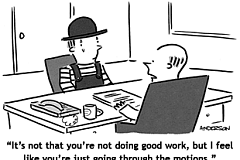 AIG. Chrysler. General Motors. Bear Stearns. These are but a few of the more notable casualties of the recession. That these giants could be so vulnerable has many small business owners, self-employed individuals, and entrepreneurs wondering, [quotes]“If vastly successful companies can topple, what about the rest of us?”[/quotes]
AIG. Chrysler. General Motors. Bear Stearns. These are but a few of the more notable casualties of the recession. That these giants could be so vulnerable has many small business owners, self-employed individuals, and entrepreneurs wondering, [quotes]“If vastly successful companies can topple, what about the rest of us?”[/quotes]
In addition to these worries is the understanding that bailouts don’t generally apply to those who are small enough to fail.
While the economy certainly plays a part in the failures of many companies, companies fail in good economic times as well. In his book, How the Mighty Fall, Jim Collins explores why the giants of industries fail and identifies the five stages of decline:
- Hubris born of success
- Undisciplined pursuit of more
- Denial of risk and peril
- Grasping for salvation
- Capitulation to irrelevance or death
Though Collins examines these stages from an industry giant perspective, these five stages of decline apply to businesses on a smaller scale. [quotesright]Not only do large companies fall prey to taking their success for granted, so too do small business owners and self-employed individuals. [/quotesright]
When you’re at the top it’s easy to be in denial that your business is in danger. Collins’ stages are cumulative, building upon one another until the final stage, capitulation to irrelevance or death, is reached.
As a small business owner, you can’t afford not to understand these five stages of decline.
Hubris Born of Success
Any successful business or individual can become insulated by their success. You worked hard to get to the top, right? You deserve to be at the top! However, do you understand why you are successful? [quotesright]Are you acknowledging the role that luck and being in the right place at the right time may have played? [/quotesright] Have you overestimated yourself or are you continuously improving so that should your luck run out, you’re well prepared?
Undisciplined Pursuit of More
Collins explains that companies that are in stage two, the undisciplined pursuit of more, have strayed from the disciplined creativity that ultimately led to their original successes. Overreaching, leaping into areas where you are not passionate, neglecting core activities while pursuing growth and expansion, and investing in areas where you cannot excel or provide better service than your competitors are all considered undisciplined pursuits. [quotes]As a small business owner, what is your core business pursuit?[/quotes] What are your core values? While growth and expansion are desirable, do not lose sight of your business’s core pursuits and values.
[sidebar]
Things Are Going Great? Fantastic!
But It Can Be Even Better…
Even if things are going great, most businesses are operating at only about 30 to 35 percent effectiveness and efficiency in any area, according to some business researchers. That means major opportunities exist to increase profit.
The surprising thing is that you’ve already done all the things smart owners do to cut out waste. But the real gold is hidden and hard to find unless you know where to look.
What would it mean if you could identify a way to improve each area of your business just 5 percent? Sales, marketing, operations, IT, billing and collections, receivables… the compound effect is huge for your bottom line.
If this sounds interesting, we should talk. USA: 877.433.6225 feedback@focalpointcoaching.com
[/sidebar]
Denial of Risk and Peril
Large companies often see internal warning signs but don’t take heed because external results may be good enough to suggest that the dangers aren’t as bad as suggested or are part of a cycle that will ultimately right itself.
What about your business? Do you do the same? [quotesright]When sales are down, do you blame the season? [/quotesright]
Blaming external forces rather than taking responsibility is denying risk and peril. Instead of blaming the “slow season” for lackluster sales and waiting for things to pick up again, take action. Don’t discount negative information or amplify positive data are you will be in denial.
Grasping for Salvation
Grasping for salvation takes many forms ranging from adopting bold, untested strategies to mergers and acquisitions. When a company is rapidly declining due to weaknesses found in the previous stages of decline (such as a sense of entitlement to success, undisciplined pursuit of more, and denial of risk), it becomes desperate for a quick save.
[quotes]While it’s natural to react and grasp for salvation, doing so can be contrary to your business’ survival.[/quotes] Instead of being reactive and haphazardly trying new approaches in a desperate attempt to survive, take a calm, focused look at what made you successful in the first place. Get back to basics.
Capitulation to Irrelevance or Death
Hopefully, you will never get to the final stage: capitulation to irrelevance or death. When companies reach this stage, their leaders have abandoned hope and the companies either become insignificant, get sold, or go out of business.
When large businesses get to this point, their failures often make the headlines small businesses do not. [quotes]Hundreds of thousands of small businesses reach stage five and quietly succumb each year. Don’t be one of them.[/quotes]
Take a lesson from the giants who fell before you and do not allow yourself to get to this point. Avoid the five stages of denial by recognizing what made you successful in the first place, never losing sight of your core values and pursuits, recognizing risks and accepting accountability, and remaining focused on the basic factors that made you successful in the first place.
[quotesright]It’s hard to do on your own. As owners, being smart and being human, we have a wonderful ability to take almost any data and twist its interpretation to match our preconceptions. [/quotesright]
Just as you’d have your books audited to catch any fraud early – yes, your valued and trusted treasurer may be a crook, it happens all the time – you should get an outsider to come in and help you do an audit of your business.














